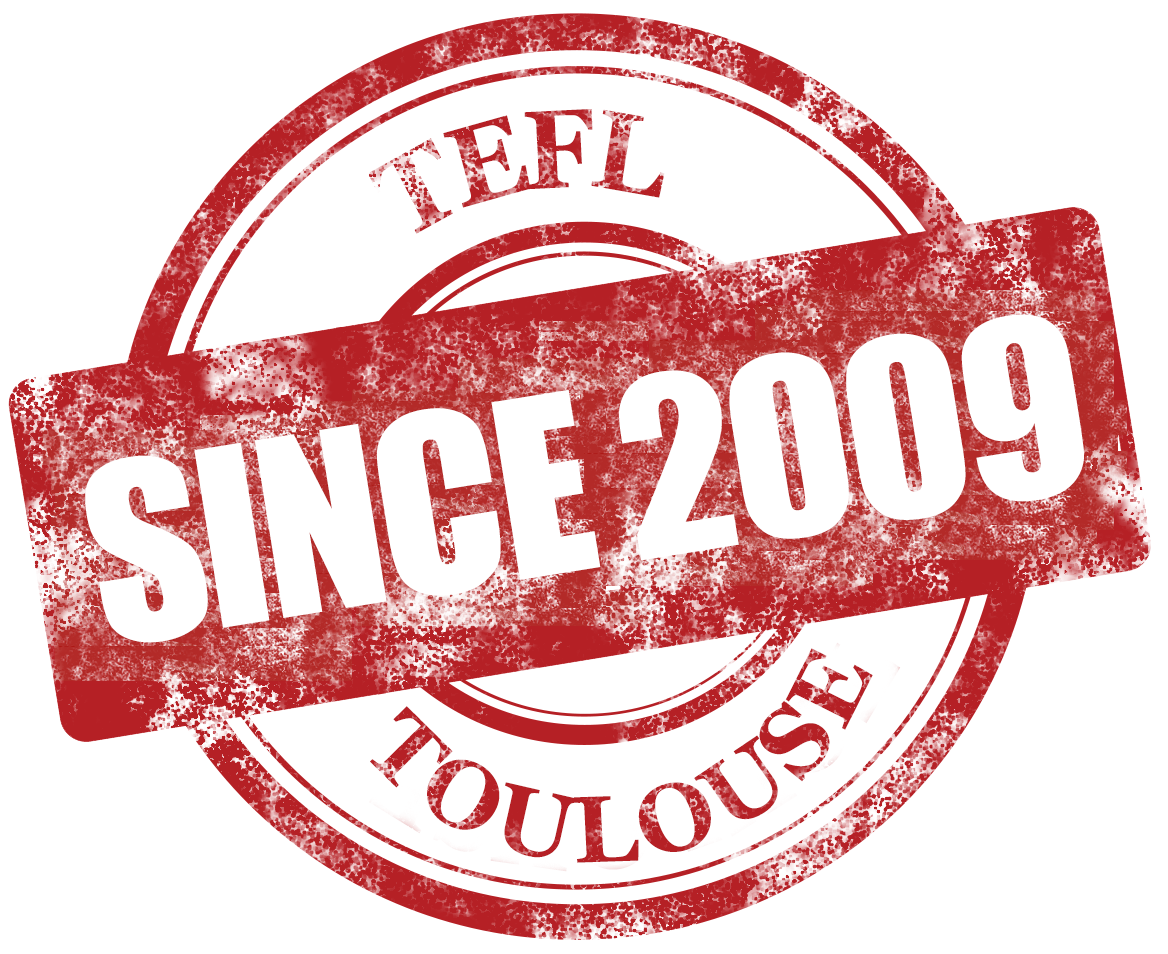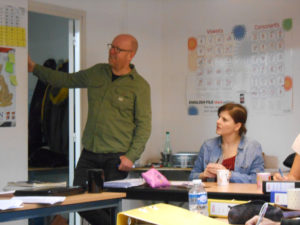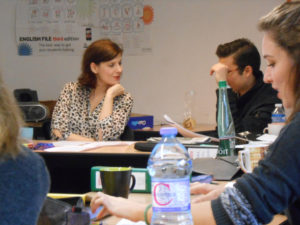Why focus on TEFL lesson planning ?
I strongly believe that teachers need to know how to plan lessons which have some sort of « golden thread » running through them and a clear, measurable and achieveable objective. So many training courses – TEFL and school teaching courses – seem to encourage a « just give them fun activities to do » or « chalk and talk » approach. But I believe that new teachers need a clear lesson planning framework to use when they begin their journey into the TEFL world. Many former schoolteachers on our TEFL Toulouse course say « if only someone had told me this on my teacher training course ! »
What’t the PPP method for planning TEFL lessons ?
It’s a method that divides the lesson into three stages of roughly equal length, Presentation, then Practice, and finally Production. It is ideal for lower level groups and one hour lessons, but can be used at all levels. It also provides an impressive lesson if asked to do one for a job interview.
What’s the presentation stage ?
This is the first part of the lesson where you do your teaching and takes about 20 to 25 minutes. We call it presentation because the students are presented with the new language that you want to teach in context (ie in a text, dialogue, audio or audio visual recording)
What’s the practice stage ?
After we’ve done our teaching, hopefully you can see that it makes sense for the students to practice what you taught them. This practice is what we trainers call « controlled » practice . Later on in the lesson the students will get « free » practice of what you taught (see below) but for now we need to « force them » them use what we just taught in a rather unnatural context. For example, if you taught how to ask questions in the past in your presentation phase, the students can create the questions for given answers. Eg
Q:……………………………………………………………. ?
A: I had salad and steak and chips for dinner.
I’d probably give them 5 to 10 of these «gap fill sentences » to make up one activity, which we can call Practice 1 (P1).
We would usually give the students two practice activities to do, each lasting about 5 to 8 minutes perhaps (you need time to go through the answers remember!).
One of these practice activities should be one where the students speak to each other as opposed to writing (above). Here’s an example of a speaking practice activity :
Student A picks up a card which simply says « go / holiday ? » and he or she must ask B
« Where did you go on your last holiday? » There is no writing involved this time, only speaking.
What’s the production stage ?
This is where the students are now ready to use what was taught and practised earlier on but « freely » this time. This means that they can choose to use what you taught or not. Perhaps a class discussion, a rôle play, a debate, or students in groups discussing statements . This would nearly always be a speaking task (students can do writing at home so don’t really like doing it in class!) This time fluency is important, rather than accuracy.
Starting and ending PPP lessons
Starting the lesson:
You need to consider how to get them interested in today’s topic. Note that the « topic » is not the grammar point – you wouldn ‘t want to try and get your students passionate about the past simple question form !
I find that the most effective way to do this is to combine the use of visuals (photos, youtube clip) with telling them your opinions / experiences of the topic before asking for theirs. We call this « activating schemata » in the profession but an easier way to think of it is to build an emotional bridge between the students and the topic.
Ending the lesson:
The last five minutes of the lesson should be « kept clear » for 3 things
1)Asking the students what they talked about in the last activity.What happened ? What did they find out about their classmate(s) ?
- Praising and correcting some errors you heard
- Any Q and A
- Set any homework
Are there any other stages in PPP lessons ?
You might want to have a warm- up stage at the lesson start, perhaps a short game. It’s important that this game doesn’t put anyone on the spot – the whole point is that it reduces anxiety and you give them something that is « can-do ». Be careful that this warm up doesn’t « eat into » the lesson too much, especially if you have a good engage stage (see above)
Getting started with lesson planning – who will you be teaching ?
The first thing you need to consider is who you’ll be teaching. What is their level ? What are their interests ? What do they need ? How many of them are in the class? For example, they work for for a pharmaceutical marketing company, their level is Intermediate, and they seem to enjoy the topic of travel, There are 6 of them in the group.
Choose a topic
Eg Travel, the environment, socialising, food and drink, family life, free time activities, technology… the topic is not the grammar point.
Choose a « student centred » learner outcome
(aka lesson aim, aka learner objective) for that topic. Don’t think about the lesson content yet.
Obviously this learner outcome needs to be level appropriate. You wouldn’t want to have advanced students saying they have one brother and one sister and live in Bordeaux, or have beginners talking about the pros and cons of veganism.
The learner outcome needs to be carefully worded so that you can use it as a compass to guide you through the lesson when the unexpected happens. Here is an example of an advanced learner objective :
Eg « Students will be able to talk about the pros and cons of a no cash society using the first conditional with modal verbs and some new phrases listed below »
and an Elementary learner objective
« students will be able to describe the physical appearance of their family or friends using « he/ she’s got » and « he/ she usually wears » and new vocabulary »
What’s wrong with « I’ll teach them how to….. » as a learner objective ?
Think about the three stages mentioned above and the fact that the learner objective dictates what happens in the lesson. What may happen in the one hour here ? A lecture ? Remember that students in 2022 are measured on their abilty to perform tasks. Knowledge isn’t enough…
Learner outcomes, the 3ms
Ideally learner outcomes should be Measurable, Managable, and Made First. So you may need to re think ! Is « students are able to succeed at a job interview » manageable within one hour ? Is « ss will learn how to talk about future plans » measurable ? A better version would be « ss are able to talk about their future plans…. » – that way you can decide at the end whether they were able to do it or whether they need more work at it.
How do I know what they need to be able to do ?
This can be tricky ,and it’s why you need to know their ability level . As a new teacher your best bet is to look at popular coursebooks (eg by Oxford, Pearson-Longman etc) to see what gets covered at each level. The first few pages of the book show the contents in terms of grammar, tasks, set phrases and vocabulary.
If it’s a business group then you need to have identified clearly what they want to be able to do and make sure it ‘s realistic for their abilty level.
The Common European Framework (CEF) which is used in Europe has « can do » statements for different levels, for students of all languages.
Are there any other approaches to TEFL lesson planning as well as PPP ?
Yes, you can’t do PPP lessons all the time or your students will find things too predictable. ARC, Test – Teach – Test, Task Based Learning are a few other approaches you’ll learn on the TEFL course, not to mention whole lessons intended to improve one of the students’ 4 skills (reading, wrting, speaking and listening) rather than grammar.
See you soon in Toulouse for your chance to try it all out !
Jonathan, Director of TEFL Toulouse




